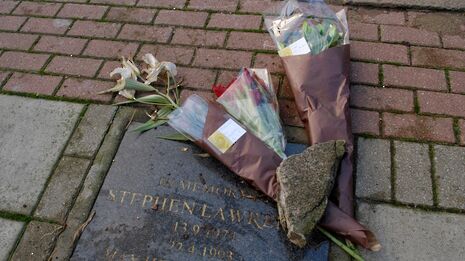Stephen Lawrence was murdered 25 years ago – but our racist institutions have learnt little
Even though 25 years have elapsed since the murder of Stephen Lawrence, Callum Moran argues that institutional racism continues to persist in this country

This year marks 25 years since the murder of Stephen Lawrence. A three-part documentary was broadcast by the BBC telling the story of the attack and the numerous failings of the police in failing to administer justice. When the police arrived on the scene of the crime to find Lawrence dead with his friend Duwayne Brooks next to him, they didn’t immediately call an ambulance or administer CPR. Instead, they assumed that because Lawrence and Brooks were black, the crime was gang related and Brooks was a suspect rather than a victim.
In the days following the murder, the police acquired specific intelligence naming individuals suspected of being involved in the attack, but no action was taken, in part because senior officers on the case did not understand their powers of arrest. Following subsequent investigations, it emerged that undercover police officers had been instructed to spy on Brooks and the Lawrence family to undermine their efforts to achieve justice. All these specific failings were symptomatic of the wider institutional racism in the police force which targeted black people in investigations even when they were the victims.
Supporting movements to decolonise the curriculum is thus one of the best ways we can fight institutional racism at the student level.
The public enquiries that uncovered these failings led to important progress, such as the removal of the exemption of the police from the Race Relations Act. However, the Macpherson Report made over 70 recommendations, many of which have still not been achieved.
One example is the blindingly obvious recommendation that police forces should be representative of the communities they serve. This recommendation dates back all the way to the Scarman Report following the 1981 Brixton Riots. Yet today, 40 out of 45 UK police forces appoint disproportionately low numbers of BME officers as compared to the areas they serve; the Met itself remains among the least representative. The makeup of these institutions really hasn’t changed; they’re still overwhelmingly white. This is especially the case at the higher levels of the institutions: 11 forces had no BME officers above the rank of Chief Inspector. This lack of BME voices at the level where institutional change can be effected has abetted the inertia against efforts to improve representation.
Consequently, the patterns of racism in the police force that plagued the Lawrence case continue to recur today. Unsolved murders of black teens, a surge in knife crime nationwide with knife deaths among children and teenagers approaching a 40-year high: these are the first signs of a surge in violent crime, even though knife crime levels are still below mid-90s levels. Of course, other factors such as cuts to police budgets have reduced their operational capabilities but the appalling lack of attention to this rash of murders begs the question of whether black lives truly matter to our politicians and our press.
Some have tried to explain the situation as one where the police are falling back into old patterns of bad behaviour, but I don’t think this explanation is good enough. By assuming that only ‘old patterns’ were problematic, the explanation suggests that there was a period when there was no bad behaviour, and thus lets the police and the politicians off the hook. In fact, at the time when recommendations from the Macpherson Report were being implemented, the government was simultaneously passing draconian anti-terror legislation targeting Muslim communities. This legislation allowed for indefinite detention without trial of suspected terrorists and gave the police wide stop-and-search powers which disproportionately affects BME communities.
These issues may seem removed from our day-to-day university life, but the fact that many of those in charge were Oxbridge-educated means that our University does have the responsibility and the power to change the current state of affairs. The curricula of many subjects remain almost entirely eurocentric and focused on white perspectives, which contributes towards this lack of awareness of racial issues among those in power. Supporting movements to decolonise the curriculum is thus one of the best ways we can fight institutional racism at the student level. Without this struggle, the institutions that make up our society will remain apathetic toward taking the necessary action to remedy institutional racism, and this apathy renders them complicit in the deaths of people on the streets of this country.
 Comment / Plastic pubs: the problem with Cambridge alehouses 5 January 2026
Comment / Plastic pubs: the problem with Cambridge alehouses 5 January 2026 News / Cambridge businesses concerned infrastructure delays will hurt growth5 January 2026
News / Cambridge businesses concerned infrastructure delays will hurt growth5 January 2026 News / New movement ‘Cambridge is Chopped’ launched to fight against hate crime7 January 2026
News / New movement ‘Cambridge is Chopped’ launched to fight against hate crime7 January 2026 News / AstraZeneca sues for £32 million over faulty construction at Cambridge Campus31 December 2025
News / AstraZeneca sues for £32 million over faulty construction at Cambridge Campus31 December 2025 Interviews / You don’t need to peak at Cambridge, says Robin Harding31 December 2025
Interviews / You don’t need to peak at Cambridge, says Robin Harding31 December 2025










